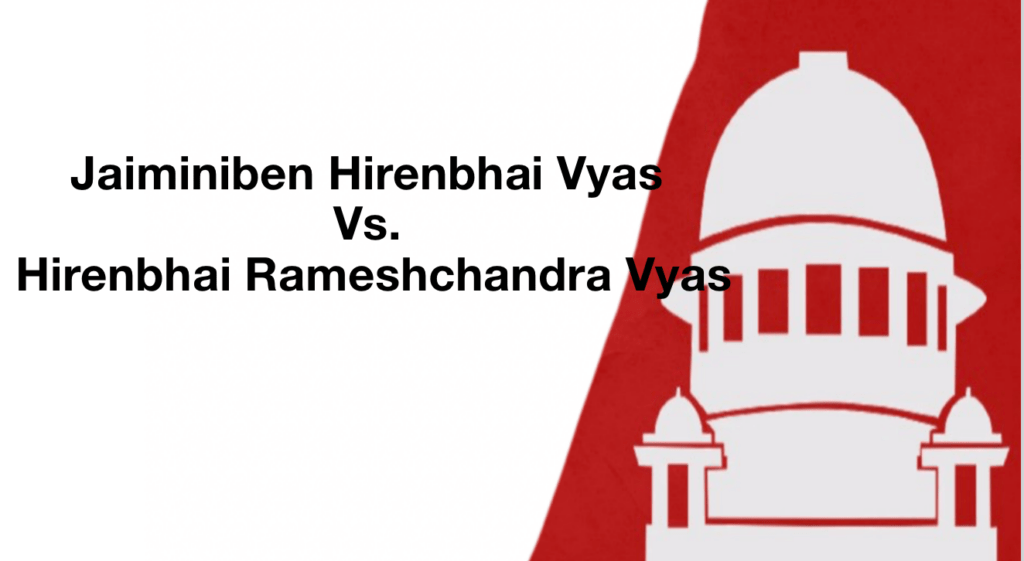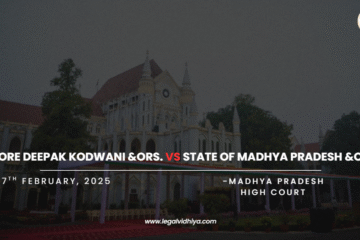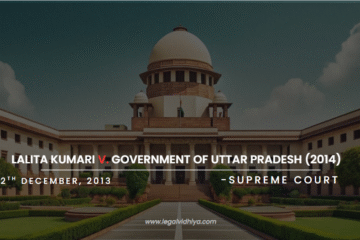
Case
Jaiminiben Hirenbhai Vyas Vs. Hirenbhai Rameshchandra Vyas
Bench
The case was heard by a bench of judges in the Gujarat High Court, which included Justice Anant S. Dave and Justice S.G. Shah.
Parties
Plaintiff -: Jaiminiben Hirenbhai Vyas
Defendant -: Hirenbhai Rameshchandra Vyas
Citation
(2010) 1 GLR 385
Introduction
The case of Jaiminiben Hirenbhai Vyas Vs. Hirenbhai Rameshchandra Vyas is one of the most notable legal disputes in Gujarat, India. It is a case of property dispute, where the plaintiff, Jaiminiben Hirenbhai Vyas, was seeking her share of family property under the Hindu Succession Act, 1956. The defendant, Hirenbhai Rameshchandra Vyas, challenged her claim, stating that the property in question was not ancestral property, and therefore, Jaiminiben was not entitled to any share. In this case analysis, we will discuss the legal issues, arguments and court rulings of this case.
Background
Jaiminiben Hirenbhai Vyas filed a suit in the court of the Civil Judge, Junior Division, in Mahesana, Gujarat, on 22nd December 2004. She claimed that she was entitled to a share in the family property, which was sold off by her brother without her consent. According to the Hindu Succession Act, 1956, daughters have equal right as sons in ancestral property. However, the defendant, Hirenbhai Rameshchandra Vyas, argued that the property in question was not ancestral property, but was acquired by his father, Rameshchandra Maganlal Vyas, through his own sources.
The defendant had two sisters and one brother, including the plaintiff. After the death of his father, Rameshchandra Maganlal Vyas, the defendant took over the family business of selling oil and oilcakes. He claimed that the disputed property was used for business purposes and was not ancestral property. In addition, he argued that he had fulfilled his moral obligation by providing financial assistance to his sisters for their marriage and to his brother for starting his business.
Legal issues
The case of Jaiminiben Hirenbhai Vyas Vs. Hirenbhai Rameshchandra Vyas has raised several legal issues, some of which are listed below:
- Whether the property in question is ancestral property or not.
- Whether the plaintiff, Jaiminiben Hirenbhai Vyas, is entitled to a share in the disputed property.
- Whether the defendant, Hirenbhai Rameshchandra Vyas, has fulfilled his moral obligation towards his sisters and brother.
Plaintiff Argument
The plaintiff, Jaiminiben Hirenbhai Vyas, argued that the disputed property was ancestral property, and therefore, she was entitled to a share. She claimed that her father, Rameshchandra Maganlal Vyas, had acquired the property through his own sources, but it was treated as ancestral property by the family. She also argued that her brother, Hirenbhai Rameshchandra Vyas, had sold off the property without her consent, which was illegal.
Defendant Argument
On the other hand, the defendant, Hirenbhai Rameshchandra Vyas, argued that the property in question was not ancestral property, but was acquired through his father’s own sources. He claimed that he had fulfilled his moral obligation towards his sisters and brother, by providing financial assistance to them. He argued that he had the right to sell the property, as he was the legal owner of the property.
Court Rulings
The court of the Civil Judge, Junior Division, in Mahesana, Gujarat, heard the case and delivered its verdict on 3rd March 2010. The court ruled that the disputed property was ancestral property and the plaintiff, Jaiminiben Hirenbhai Vyas, was entitled to one-fourth share in the property. The court also declared the sale of the property by the defendant, Hirenbhai Rameshchandra Vyas, as illegal and ordered him to pay the plaintiff her share of the property.
The defendant appealed against the decision of the lower court in the Gujarat High Court. The Gujarat High Court upheld the decision of the lower court and dismissed the appeal of the defendant. The court observed that the disputed property was ancestral property and the plaintiff was entitled to a share in it. The court also stated that the defendant had failed to prove that he had fulfilled his moral obligation towards his sisters and brother.
Conclusion
The case of Jaiminiben Hirenbhai Vyas Vs. Hirenbhai Rameshchandra Vyas is an important legal precedent in Hindu law, as it defines the concept of ancestral property and the rights of daughters in such property. The case also highlights the importance of fulfilling moral obligations towards family members and the legal consequences of not doing so. It is a landmark case, which has provided legal clarity on issues related to the property rights of women in India.
This article is written by Ananya Singh of Integral University, Lucknow of 8th Semester




0 Comments